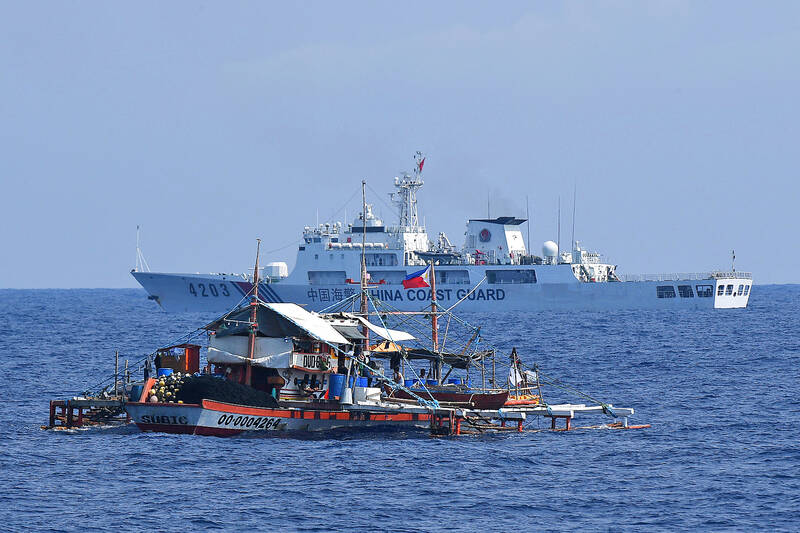A Philippine boat convoy bearing supplies for Filipino fishers yesterday said that it was headed back to port, ditching plans to sail to a reef off the Southeast Asian country after one of their boats was “constantly shadowed” by a Chinese vessel.
The Atin Ito (“This Is Ours”) coalition convoy on Wednesday set sail to distribute fuel and food to fishers and assert Philippine rights in the disputed South China Sea.
“They will now proceed to the Subic fish port to mark the end of their successful mission,” the group said in a statement.

Photo: AFP
A Philippine Coast Guard vessel escorting the convoy was also returning to the same port, the agency said.
The convoy earlier learned from fishers on boats near Scarborough Shoal (Huangyan Island, 黃岩島) — which Taiwan also claims — via radio “that they had been chased away by the Chinese,” said Emman Hizon, spokesman for the non-government group.
However, its “advance team” distributed fuel and other assistance to fishers on Wednesday about 46km to 56km from the shoal, declaring “mission accomplished.”
The advance team boat, which returned to a Philippine port yesterday morning, was “able to distribute aid despite being constantly shadowed by a Chinese Navy vessel,” Hizon told reporters.
A reconnaissance flight saw 19 Chinese vessels, including a warship and eight coast guard vessels, around the shoal on Wednesday, the Philippine Coast Guard said.
It said the main contingent of the flotilla from the Philippines, comprising four wooden-hulled fishing boats, was still being tracked by nearby China Coast Guard vessels even as it sailed away from the shoal.
The shadowing began at dusk on Wednesday as the boats moved closer to the shoal, with the Chinese vessels issuing warnings that the participants heard on their radios.
Asked about the allegations that Chinese vessels drove off fishers, the Chinese embassy in Manila referred to a warning by a Chinese Ministry of Foreign Affairs spokesman on Wednesday against any attempt to infringe on Beijing’s “indisputable sovereignty” over Scarborough Shoal.

OPTIMISTIC: A Philippine Air Force spokeswoman said the military believed the crew were safe and were hopeful that they and the jet would be recovered A Philippine Air Force FA-50 jet and its two-person crew are missing after flying in support of ground forces fighting communist rebels in the southern Mindanao region, a military official said yesterday. Philippine Air Force spokeswoman Colonel Consuelo Castillo said the jet was flying “over land” on the way to its target area when it went missing during a “tactical night operation in support of our ground troops.” While she declined to provide mission specifics, Philippine Army spokesman Colonel Louie Dema-ala confirmed that the missing FA-50 was part of a squadron sent “to provide air support” to troops fighting communist rebels in

ANGER: A video shared online showed residents in a neighborhood confronting the national security minister, attempting to drag her toward floodwaters Argentina’s port city of Bahia Blanca has been “destroyed” after being pummeled by a year’s worth of rain in a matter of hours, killing 13 and driving hundreds from their homes, authorities said on Saturday. Two young girls — reportedly aged four and one — were missing after possibly being swept away by floodwaters in the wake of Friday’s storm. The deluge left hospital rooms underwater, turned neighborhoods into islands and cut electricity to swaths of the city. Argentine Minister of National Security Patricia Bullrich said Bahia Blanca was “destroyed.” The death toll rose to 13 on Saturday, up from 10 on Friday, authorities

Two daughters of an Argentine mountaineer who died on an icy peak 40 years ago have retrieved his backpack from the spot — finding camera film inside that allowed them a glimpse of some of his final experiences. Guillermo Vieiro was 44 when he died in 1985 — as did his climbing partner — while descending Argentina’s Tupungato lava dome, one of the highest peaks in the Americas. Last year, his backpack was spotted on a slope by mountaineer Gabriela Cavallaro, who examined it and contacted Vieiro’s daughters Guadalupe, 40, and Azul, 44. Last month, the three set out with four other guides

ECONOMIC DISTORTION? The US commerce secretary’s remarks echoed Elon Musk’s arguments that spending by the government does not create value for the economy US Secretary of Commerce Howard Lutnick on Sunday said that government spending could be separated from GDP reports, in response to questions about whether the spending cuts pushed by Elon Musk’s Department of Government Efficiency could possibly cause an economic downturn. “You know that governments historically have messed with GDP,” Lutnick said on Fox News Channel’s Sunday Morning Futures. “They count government spending as part of GDP. So I’m going to separate those two and make it transparent.” Doing so could potentially complicate or distort a fundamental measure of the US economy’s health. Government spending is traditionally included in the GDP because